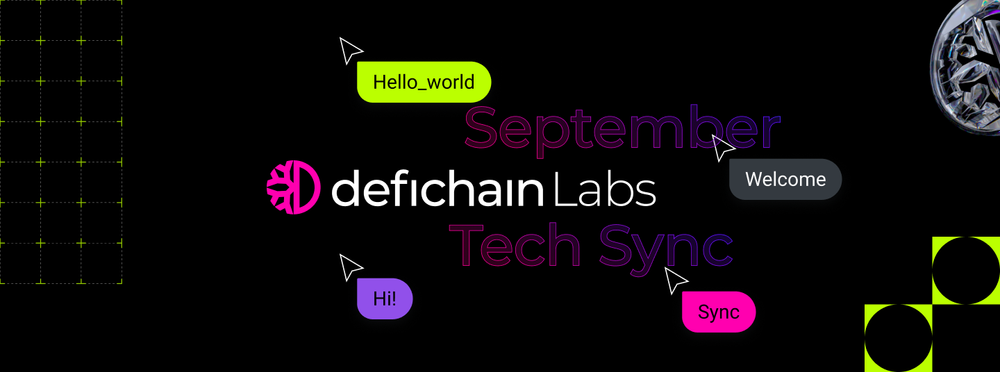DeFiChain Labs Tech Sync – September 2024
The DeFiChain Labs team recently held their monthly Tech Sync, offering valuable insights into ongoing projects and upcoming network enhancements.
Here’s a summary of the updates:
Technical Updates: Laying the Groundwork
Before we explore the governance changes, it's crucial to understand the technical updates that are paving the way for the governance upgrade:
- Changi Node Release: The latest node version has been released with improvements to the dToken system. Kügi has been leading the charge on restarting the dToken system on Changi.
- Bug Fixes and Optimizations: The team is actively addressing minor bugs and unexpected conditions, such as oracle downtime and token locking scenarios. Kügi and Peter have been working together to fix these issues.
- Token Restart: A major focus has been on optimizing the token restart process, aiming to reduce network downtime from a day to just a few minutes. The team is planning to set a couple of token splits post-restart to understand behavior and ensure everything is functioning correctly.
- Performance Improvements: Work is underway to enhance consolidation processes, making them more efficient and less disruptive to the network. The team is exploring ways to make consolidation a regular, automatic process that runs periodically when nodes are idle.
- Additional Updates:
- Rejecting of past time blocks is already active in Changi.
- Updating Token address is in testing.
- Deprecation of Tokens is also in testing.
- Foster block time update is being finalized by Peter.
These technical updates are crucial for ensuring a smooth transition to the new governance model and improving overall network performance.
The Evolution of DeFiChain Governance
DeFiChain's governance has undergone several phases of evolution:
- Genesis: Initial foundation keys managed token creation and minting, with DFIPs and CFPs handled on GitHub.
- Bay Fork: Introduced liquidity and DEX features, expanding foundation key responsibilities.
- Fort Canning: Brought in vaults, loans, and on-chain attributes, still managed by foundation keys.
- Grand Central Upgrade: Introduced on-chain governance, moving DFIPs and CFPs fully on-chain.
The Upcoming Governance Upgrade
The next major upgrade aims to further decentralize governance and phase out centralized control. Key aspects of this upgrade include:
- Downsizing Foundation Powers: Reducing the scope of foundation key capabilities. This includes removing the ability to mint any token and equalizing the foundation's role with general governance.
- Community Governance Introduction: Shifting critical operations to a more transparent, community-driven model. This will be facilitated through a new governance repository where key collaboration will happen.
- Special Interest Groups (SIGs): Creating focused groups for various aspects of the ecosystem, such as:
- Execution SIG
- Nodes SIG
- Token Economy SIG
- Oracle SIG
- Explorer Infrastructure SIG
- Wallet SIG
- Execution SIG: A temporary measure to bridge the gap between current centralization and full decentralization. This SIG will take over the role of the foundation keys but will rely on consensus from other SIGs to make decisions.
How the New Governance Will Work
The new governance model will follow a structured process:
- Issue Creation: Anyone can create an issue in the governance repository, addressing it to a specific SIG.
- SIG Discussion: SIG members discuss the issue and reach consensus based on predefined rules. Each SIG will maintain its own directory in the GitHub repo detailing its key operations and governance structure.
- Consensus Achievement: Once consensus is reached (e.g., 3 out of 5 members agree), the issue is assigned to the Execution SIG.
- Execution Verification: The Execution SIG verifies that consensus was achieved according to the SIG's rules.
- Implementation: The Execution SIG implements the decision on-chain, documenting the execution and any issues encountered.
This process ensures transparency, community involvement, and checks and balances in decision-making.
Additional Governance Features
- Time Buffer: Any changes set by the Execution SIG will have a time buffer (initially set to 6 hours) before implementation. This allows for community auditing and potential cancellation if needed.
- Transparent Documentation: All SIG operations, rules of engagement, and decision-making processes will be publicly documented in the governance repository.
- Community Participation: The DeFiChain team is actively seeking volunteers from the community to participate in various SIGs.
The Road Ahead
While these changes mark a significant step towards decentralization, they are part of an ongoing process. Future developments may include:
- Further refinement of SIG structures and processes
- Potential introduction of new SIGs or modification of existing ones through community proposals (via DFIPs)
- Gradual phasing out of the Execution SIG as more operations become fully decentralized
- Integration of these governance changes with the Ocean update, which is currently being synced and debugged
Conclusion
DeFiChain's governance evolution represents a bold move towards true decentralization. By distributing power among various community-driven groups and implementing transparent decision-making processes, the network is setting a new standard for blockchain governance.
As these changes roll out, community participation will be crucial. Whether through joining SIGs, proposing improvements, or simply staying informed, every member of the DeFiChain ecosystem has a role to play in shaping its future.
The coming months will be an exciting time for DeFiChain as it embarks on this new chapter of decentralized governance. Stay tuned for further updates and opportunities to get involved in this groundbreaking initiative.

